
The graphic is by the Finnish Immigration Service, available here: http://www.migri.fi/download/57705_2014_tilastograafit_en.pdf?c97a94c6f234d288
0.03% of the world’s refugees live in Finland. You wouldn’t think that from the way the issue gets portrayed by many Finnish politicians and in the local media, but numbers are pathetically low. In 2014 for instance, 1 346 individuals received asylum in Finland, while another 1030 were accepted under the country’s refugee quota system.
These are some of things I learnt at a workshop organised by the Finnish Refugee Council last week. Established in 1965, the organisation supports refugees and immigrants in Finland, as well as refugees in Liberia, Sierra Leone, Uganda and Thailand.
I’ve decided to volunteer with the Refugee Council to combat what appears to be a rise in negative attitudes towards foreigners in Finland, as well as counter the spread of what can only be called misinformation about the extent and type of immigration to the country. As a first activity, I look forward to welcoming Liberian Cucu and his Kenyan wife Gloria for a meal to our house as part of a multicultural exchange.
There are now over 50 million people forcibly displaced worldwide. That’s the highest level of displacement ever recorded. The three top origins for displaced people are Afghanistan (2.56 million), Syria (2.47 million), and Somalia (1.12 million). That’s a lot of lives put on hold, people stuck at camps and in uncertainty and boredom.
Rita used to be one of them. Having fled the Rwandan genocide as a teenager, she spent time – sometimes in hiding – in the Congo, Kenya, and Senegal before being accepted as a refugee in Finland as part of the official quota. When she told us her story at the Refugee Council workshop, she described the moment she received official identification papers ahead of travelling to Finland: “Once you get papers, you become a real person.”
It’s evident Finland can’t offer a home to all of the world’s refugees. But clearly we can do more. After all, 86% of the world’s refugees are hosted by developing countries with significantly less resources with which to offer the displaced safety from persecution, conflict, and violence. One in every five people in Lebanon today is a refugee.
And the fact is, recession or not, more immigration into our small northern state is actually good for us. Apart from the many benefits deriving from learning about and living among other cultures, research conducted by OECD in 2013 showed that, fiscally, Finland benefits more from immigration than it costs. I wish that was something that featured more prominently in the public debate, especially as we head towards the April elections with the xenophobic Perussuomalaiset party predicted to get around 15% of the vote.